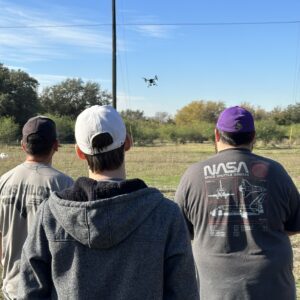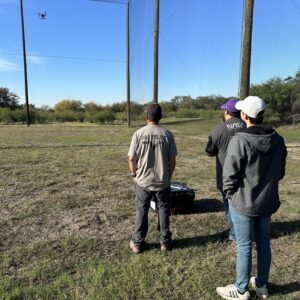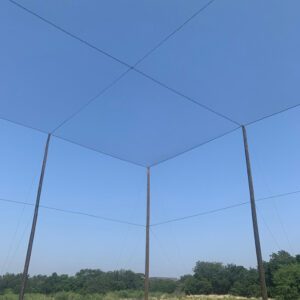 New Enclosure Enables Advanced Drone Research and Testing at UTSA
New Enclosure Enables Advanced Drone Research and Testing at UTSA
By DRONELIFE Features Editor Jim Magill
Standing on the campus of the University of Texas at San Antonio a 900,000-cubic-foot enclosure composed of telephone poles and wire netting provides university researchers and drone enthusiasts a chance to test out and fly their aircraft without having to comply with FAA regulations.
The enclosure, which measures 150 feet by 100 feet by 60 feet tall, provides enough space to operate UAV’s in real-world, outdoor conditions without the operator having to first obtain a Part 107 license, said Christopher Combs, Ph.D., director of UTSA’ aerospace engineering program.
“The best analogy is a baseball batting cage,” Combs, an associate professor of mechanical engineering, said.
 He said because the testing facility is enclosed, and is therefore not a part of the FAA-regulated airspace, it allows faculty members who use drones as part of their research, but who are not necessarily registered drone pilots themselves, the opportunity to fly.
He said because the testing facility is enclosed, and is therefore not a part of the FAA-regulated airspace, it allows faculty members who use drones as part of their research, but who are not necessarily registered drone pilots themselves, the opportunity to fly.
“We have researchers doing all kinds of stuff, anything where you really need a large space to fly a drone,” Combs said. “You can only do so much in a lab space.”
In one example of the use of the enclosure, civil and environmental engineering researchers employed drone and artificial intelligence technology to study ways to put UAVs to work in intelligent construction management and surveying. “If you can imagine it, instead of having to survey a bridge or a big beam of a highway overpass that’s under construction, you can fly a drone over it and then use AI or machine learning to interpret those images,” Combs said.
He said he has also employed the outdoor testing facility himself in his own research in the field of aerodynamics.
“I do fluid physics and fluid visualization, and so we’re talking about taking some of our cameras and our measurement techniques out there to go and actually watch some drones in free flight and measure the air flow around the drones,” he said. “So, we needed a big enough space to where we could actually do that.”
 The enclosure, which began operations in June 2023, was built at a cost of about $150,000 in university strategic investment funds. Combs said he believes it is the third largest facility of its type in the country and one of the largest to have been funded and built by a university.
The enclosure, which began operations in June 2023, was built at a cost of about $150,000 in university strategic investment funds. Combs said he believes it is the third largest facility of its type in the country and one of the largest to have been funded and built by a university.
Combs is also the director of the UTSA’s Center for Advanced Measurements in Extreme Environments. The mission of CAMMEE, which started as a NASA-funded center, focuses on building a sustainable source of diverse, highly trained researchers to enter the nation’s workforce in the fields of earth system sciences, remote-sensing technologies, computational fluid dynamics and experimental fluid mechanics.
He said the construction of the outdoor drone training enclosure is part of a larger effort to recruit and train the next generation of aerospace professionals.
“I kind of came here with a mandate to develop the aerospace engineering program, so that’s a big part of what I’ve been working on,” he said.
In the little over a year since the drone-testing enclosure was constructed, Combs and his colleagues have been getting the word out about the facility to fellow faculty members as well as to the general public. “We really are starting to get a lot of interest from inside the university and from the external community as well,” he said.
With the opportunities for drone research and testing that the enclosure provides, Combs said the university is looking to expand its curriculum to bring in more non-faculty participation. “We’re looking at community outreach-type projects and getting students in there, whether it’s K-12 or college students. And we’re actively talking to people about ways that we can leverage the strong parts of research here at the university as well,” he said.
Read more:
- Targeting Rogue Drones: University of Kentucky Professor Wins Prestigious NSF Award
- Columbus State University Expands Robotics Engineering Program with New Fort Moore Partnership
- Horizontal Drone Landings: Tohoku University’s EAGLES Port Sets New Standard
 Jim Magill is a Houston-based writer with almost a quarter-century of experience covering technical and economic developments in the oil and gas industry. After retiring in December 2019 as a senior editor with S&P Global Platts, Jim began writing about emerging technologies, such as artificial intelligence, robots and drones, and the ways in which they’re contributing to our society. In addition to DroneLife, Jim is a contributor to Forbes.com and his work has appeared in the Houston Chronicle, U.S. News & World Report, and Unmanned Systems, a publication of the Association for Unmanned Vehicle Systems International.
Jim Magill is a Houston-based writer with almost a quarter-century of experience covering technical and economic developments in the oil and gas industry. After retiring in December 2019 as a senior editor with S&P Global Platts, Jim began writing about emerging technologies, such as artificial intelligence, robots and drones, and the ways in which they’re contributing to our society. In addition to DroneLife, Jim is a contributor to Forbes.com and his work has appeared in the Houston Chronicle, U.S. News & World Report, and Unmanned Systems, a publication of the Association for Unmanned Vehicle Systems International.

Miriam McNabb is the Editor-in-Chief of DRONELIFE and CEO of JobForDrones, a professional drone services marketplace, and a fascinated observer of the emerging drone industry and the regulatory environment for drones. Miriam has penned over 3,000 articles focused on the commercial drone space and is an international speaker and recognized figure in the industry. Miriam has a degree from the University of Chicago and over 20 years of experience in high tech sales and marketing for new technologies.
For drone industry consulting or writing, Email Miriam.
TWITTER:@spaldingbarker
Subscribe to DroneLife here.

 New Enclosure Enables Advanced Drone Research and Testing at UTSA
New Enclosure Enables Advanced Drone Research and Testing at UTSA





LOS and FPV and Remote Location practice in enclosed areas like this will train for proficiency of situational awareness of obstacles, portals, altitude, energy management, precision flying, dynamic ground activity flight integration, etc.
Set up structures inside, obstacle courses, race courses, treasure hunts, weather and water work, perching, payload delivery and pick up…
So cheap. These are going to pop up all over the place.
What to do about getting trapped in those nets though? They probably have a plan.
Hook ’em Horns.